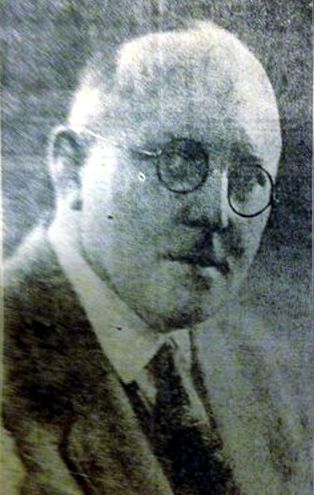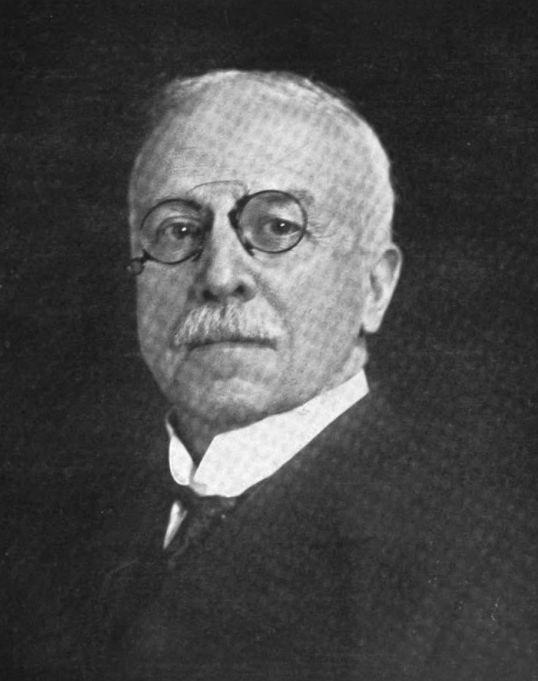|
G. Charter Harrison
George Charter Harrison (1881 1959) was an Anglo-American management consultant and cost account pioneer, known for designing one of the earliest known complete standard cost systems. Michael Chatfield.Harrison, G. Charter 1881-," in: Michael Chatfield, Richard Vangermeersch (eds.), ''The History of Accounting (RLE Accounting): An International Encyclopedia'' 2014. p. 291. Biography G. Charter Harrison was born and educated in England and passed eighth in order of merit in the Anal examination of the Institute of Chartered Accountants in England and Wales. For eight years, up to October, 1916, he was employed by Price, Waterhouse & Company in various capacities: during the later part of this period as manager of the system division of that firm. From January, 1909, to February, 1911, he was comptroller for the Russell, Burdsall and Ward Bolt & Nut Company. At the latter date he returned to Price, Waterhouse & Company to take up the managership of the system division.''Factory ... [...More Info...] [...Related Items...] OR: [Wikipedia] [Google] [Baidu] |
Standard Cost Accounting
Standard cost accounting is a traditional cost accounting method introduced in the 1920s, as an alternative for the traditional cost accounting method based on historical costs.Adolph Matz (1962) ''Cost accounting.'' p. 584. Overview Standard cost accounting uses ratios called efficiencies that compare the labor and materials actually used to produce a good with those that the same goods would have required under "standard" conditions. As long as actual and standard conditions are similar, few problems arise. Unfortunately, standard cost accounting methods developed about 100 years ago, when labor comprised the most important cost of manufactured goods. Standard methods continue to emphasize labor efficiency even though that resource now constitutes a (very) small part of the cost in most cases ". Standard cost accounting can hurt managers, workers, and firms in several ways. For example, a policy decision to increase inventory can harm a manufacturing manager's performance eval ... [...More Info...] [...Related Items...] OR: [Wikipedia] [Google] [Baidu] |
Engineer
Engineers, as practitioners of engineering, are professionals who invent, design, analyze, build and test machines, complex systems, structures, gadgets and materials to fulfill functional objectives and requirements while considering the limitations imposed by practicality, regulation, safety and cost. "Science is knowledge based on our observed facts and tested truths arranged in an orderly system that can be validated and communicated to other people. Engineering is the creative application of scientific principles used to plan, build, direct, guide, manage, or work on systems to maintain and improve our daily lives." The word ''engineer'' (Latin ) is derived from the Latin words ("to contrive, devise") and ("cleverness"). The foundational qualifications of an engineer typically include a four-year Bachelor of Engineering, bachelor's degree in an engineering discipline, or in some jurisdictions, a Master of Engineering, master's degree in an engineering discipline plus ... [...More Info...] [...Related Items...] OR: [Wikipedia] [Google] [Baidu] |
British Accountants
British may refer to: Peoples, culture, and language * British people, nationals or natives of the United Kingdom, British Overseas Territories, and Crown Dependencies. ** Britishness, the British identity and common culture * British English, the English language as spoken and written in the United Kingdom or, more broadly, throughout the British Isles * Celtic Britons, an ancient ethno-linguistic group * Brittonic languages, a branch of the Insular Celtic language family (formerly called British) ** Common Brittonic, an ancient language Other uses *'' Brit(ish)'', a 2018 memoir by Afua Hirsch *People or things associated with: ** Great Britain, an island ** United Kingdom, a sovereign state ** Kingdom of Great Britain (1707–1800) ** United Kingdom of Great Britain and Ireland (1801–1922) See also * Terminology of the British Isles * Alternative names for the British * English (other) * Britannic (other) * British Isles * Brit (other) * Br ... [...More Info...] [...Related Items...] OR: [Wikipedia] [Google] [Baidu] |
American Business Theorists
American(s) may refer to: * American, something of, from, or related to the United States of America, commonly known as the "United States" or "America" ** Americans, citizens and nationals of the United States of America ** American ancestry, people who self-identify their ancestry as "American" ** American English, the set of varieties of the English language native to the United States ** Native Americans in the United States, indigenous peoples of the United States * American, something of, from, or related to the Americas, also known as "America" ** Indigenous peoples of the Americas * American (word), for analysis and history of the meanings in various contexts Organizations * American Airlines, U.S.-based airline headquartered in Fort Worth, Texas * American Athletic Conference, an American college athletic conference * American Recordings (record label), a record label previously known as Def American * American University, in Washington, D.C. Sports teams Soccer ... [...More Info...] [...Related Items...] OR: [Wikipedia] [Google] [Baidu] |
1959 Deaths
Events January * January 1 - Cuba: Fulgencio Batista flees Havana when the forces of Fidel Castro advance. * January 2 - Lunar probe Luna 1 was the first man-made object to attain escape velocity from Earth. It reached the vicinity of Earth's Moon, and was also the first spacecraft to be placed in heliocentric orbit. * January 3 ** The three southernmost atolls of the Maldive Islands, Maldive archipelago (Addu Atoll, Huvadhu Atoll and Fuvahmulah island) United Suvadive Republic, declare independence. ** Alaska is admitted as the 49th U.S. state. * January 4 ** In Cuba, rebel troops led by Che Guevara and Camilo Cienfuegos enter the city of Havana. ** Léopoldville riots: At least 49 people are killed during clashes between the police and participants of a meeting of the ABAKO Party in Kinshasa, Léopoldville in the Belgian Congo. * January 6 ** Fidel Castro arrives in Havana. ** The International Maritime Organization is inaugurated. * January 7 – The United States rec ... [...More Info...] [...Related Items...] OR: [Wikipedia] [Google] [Baidu] |
1881 Births
Events January–March * January 1– 24 – Siege of Geok Tepe: Russian troops under General Mikhail Skobelev defeat the Turkomans. * January 13 – War of the Pacific – Battle of San Juan and Chorrillos: The Chilean army defeats Peruvian forces. * January 15 – War of the Pacific – Battle of Miraflores: The Chileans take Lima, capital of Peru, after defeating its second line of defense in Miraflores. * January 24 – William Edward Forster, chief secretary for Ireland, introduces his Coercion Bill, which temporarily suspends habeas corpus so that those people suspected of committing an offence can be detained without trial; it goes through a long debate before it is accepted February 2. * January 25 – Thomas Edison and Alexander Graham Bell form the Oriental Telephone Company. * February 13 – The first issue of the feminist newspaper ''La Citoyenne'' is published by Hubertine Auclert. * February 16 – The Canad ... [...More Info...] [...Related Items...] OR: [Wikipedia] [Google] [Baidu] |
Copyright Status Of Work By The U
A copyright is a type of intellectual property that gives its owner the exclusive right to copy, distribute, adapt, display, and perform a creative work, usually for a limited time. The creative work may be in a literary, artistic, educational, or musical form. Copyright is intended to protect the original expression of an idea in the form of a creative work, but not the idea itself. A copyright is subject to limitations based on public interest considerations, such as the fair use doctrine in the United States. Some jurisdictions require "fixing" copyrighted works in a tangible form. It is often shared among multiple authors, each of whom holds a set of rights to use or license the work, and who are commonly referred to as rights holders. These rights frequently include reproduction, control over derivative works, distribution, public performance, and moral rights such as attribution. Copyrights can be granted by public law and are in that case considered "territorial righ ... [...More Info...] [...Related Items...] OR: [Wikipedia] [Google] [Baidu] |
Diagram Illustrating Method Of Charting Routine Operations, 1921
A diagram is a symbolic representation of information using visualization techniques. Diagrams have been used since prehistoric times on walls of caves, but became more prevalent during the Enlightenment. Sometimes, the technique uses a three-dimensional visualization which is then projected onto a two-dimensional surface. The word '' graph'' is sometimes used as a synonym for diagram. Overview The term "diagram" in its commonly used sense can have a general or specific meaning: * ''visual information device'' : Like the term "illustration", "diagram" is used as a collective term standing for the whole class of technical genres, including graphs, technical drawings and tables. * ''specific kind of visual display'' : This is the genre that shows qualitative data with shapes that are connected by lines, arrows, or other visual links. In science the term is used in both ways. For example, Anderson (1997) stated more generally: "diagrams are pictorial, yet abstract, represent ... [...More Info...] [...Related Items...] OR: [Wikipedia] [Google] [Baidu] |
Harrington Emerson
Harrington Emerson (August 2, 1853 – September 2, 1931) was an American efficiency engineer and business theorist,Harrington Emerson Papers, 1848-1931 at Penn State. who founded the management consultancy firm Emerson Institute in New York City in 1900. Known for his pioneering contributions to , Emerson may have done more than anyone else to popularize the topic:Drury, p. 129 His public testimony in 1910 to the that the railroads co ... [...More Info...] [...Related Items...] OR: [Wikipedia] [Google] [Baidu] |
Frederick Winslow Taylor
Frederick Winslow Taylor (March 20, 1856 – March 21, 1915) was an American mechanical engineer. He was widely known for his methods to improve industrial efficiency. He was one of the first management consultants. In 1909, Taylor summed up his efficiency techniques in his book '' The Principles of Scientific Management'' which, in 2001, Fellows of the Academy of Management voted the most influential management book of the twentieth century. His pioneering work in applying engineering principles to the work done on the factory floor was instrumental in the creation and development of the branch of engineering that is now known as industrial engineering. Taylor made his name, and was most proud of his work, in scientific management; however, he made his fortune patenting steel-process improvements. As a result, scientific management is sometimes referred to as ''Taylorism''. Biography Taylor was born in 1856 to a Quaker family in Germantown, Philadelphia, Pennsylvania. Taylo ... [...More Info...] [...Related Items...] OR: [Wikipedia] [Google] [Baidu] |





